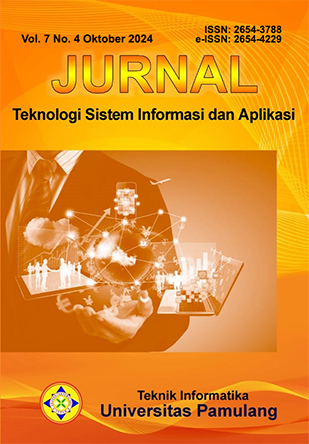Analisis Usability Aplikasi Sistem Database Pemasyarakatan Menggunakan Use Questionnaire dan Pengaruh Usefulness, Ease of Use, Ease of Learning terhadap User Satisfaction Menggunakan Regresi Linier
DOI:
https://doi.org/10.32493/jtsi.v7i4.40127Kata Kunci:
Analisis; Usability; USE; Questionnaire; SDPAbstrak
Direktorat Jenderal Pemasyarakatan (Ditjenpas) telah mengembangkan berbagai macam layanan Teknologi Informasi salah satunya adalah Aplikasi Sistem Database Pemasyarakatan (SDP). Sampai dengan saat ini, pengembangan Aplikasi SDP belum memastikan bahwa sistem dapat memberikan manfaat maksimal dalam mengelola dan meningkatkan efektivitas sistem pemasyarakatan. Oleh karena itu, perlu dilakukan analisis usability aplikasi SDP berdasarkan persepsi pengguna. Pada penelitian ini, dilakukan analisis usability aplikasi SDP menggunakan metode USE Questionnaire. USE Questionnaire yang merupakan sebuah instrumen yang biasa digunakan untuk mengukur usability suatu aplikasi dengan empat parameter, yaitu usefulness, ease of use, ease of learning, dan user satisfaction. Penelitian ini melibatkan 100 orang responden.Hasil pengujian instrumen menunjukkan semua pertanyaan valid dan reliabel, sehingga dapat digunakan dalam penelitian. Hasil pengukuran dari keseluruhan variabel USE Questionnaire, diperoleh dari skor responden sebesar 9.647 dan skor maksimal pada aspek ini yaitu 11.200, maka diperoleh persentase kelayakan sebesar 86,13%. Dengan demikian dapat disimpulkan bahwa tingkat usability dari aplikasi SDP dikategorikan “Sangat Layak” digunakan dalam proses pemasyarakatan.
Referensi
Dewi1, L. E., , Nyoman Trisna Herawati. SE., M.Pd., A., Erni, . Luh Gede, Sulindawati. SE., M.Pd., A., & . (2015). Analisis Pengaruh NIM, BOPO, LDR, dan NPL Terhadap Profitabilitas (Studi Kasus Pada Bank Umum Swasta Nasional Yang Terdaftar Pada Bursa Efek Indonesia Periode 2009-2013). Jurusan Akuntansi Program S1, 3(1).
Dwiyani Hadiwidjaja, R., & Fera Triani, L. (2009). Pengaruh Profitabilitas terhadap Dividend Payout Ratio pada Perusahaan Manufaktur di Indonesia. Jurnal Organisasi dan Manajemen, 5(1). https://doi.org/10.33830/jom.v5i1.214.2009
Fernanda, R. G., Suryadi, E., & Ali M, S. (2022). Pengukuran Usability Aplikasi Zoom Meeting Sebagai Media E-Learning Menggunakan Use Questionnaire. Jurnal Konseling Pendidikan Islam, 3(1). https://doi.org/10.32806/jkpi.v3i1.99
Ghozali, I. (2018). Aplikasi Analisis Multivariate Dengan Program IBM SPSS25. Badan Penerbit Universitas Diponegoro.
Lubis, B. O., Salim, A., & Jefi, J. (2020). Evaluasi Usability Sistem Aplikasi Mobile JKN Menggunakan Use Questionnaire. Jurnal SAINTEKOM, 10(1). https://doi.org/10.33020/saintekom.v10i1.131
Noor Aini Muflikhatun, M. (2024). Jurnal Teknologi Sistem Informasi dan Aplikasi Analisis Pengaruh Kualitas Website Simojang Berdasarkan Metode Webqual 4.0 dan Importance Performance Analysis (IPA) terhadap Kepuasan Pengguna. 7(1), 185–199. https://doi.org/10.32493/jtsi.v7i1.37847
Putra, Y. S. M., & Tanamal, R. (2020). Analisis Usability Menggunakan Metode USE Questionnaire Pada Website Ciputra Enterprise System. Teknika, 9(1). https://doi.org/10.34148/teknika.v9i1.267
Sufandi, U. U., Priono, M., Aprijani, D. A., Wicaksono, B. A., & Trihapningsari, D. (2022). Uji Usability Fungsi Aplikasi Web Sistem Informasi Dengan Use Questionnaire (Studi Kasus : Aplikasi Web Sistem Informasi Tiras dan Transaksi Bahan Ajar). Jurnal Pendidikan Teknologi Dan Kejuruan, 19(1).
Yahya, M. A., Wahyuningrum, T., & Adi Prasetyo, N. (2022). Usability Testing pada Prototype Aplikasi Mobile PlayKids Menggunakan USE Questionnaire. Journal of Applied Computer Science and Technology, 3(1). https://doi.org/10.52158/jacost.v3i1.160
Unduhan
Diterbitkan
Cara Mengutip
Terbitan
Bagian
Lisensi
Hak Cipta (c) 2024 Arif Rachman, Lussiana ETP

Artikel ini berlisensi Creative Commons Attribution-NonCommercial 4.0 International License.
Authors who publish with this journal agree to the following terms:
- Authors retain copyright and grant the journal right of first publication with the work simultaneously licensed under a Creative Commons Attribution License that allows others to share the work with an acknowledgement of the work's authorship and initial publication in this journal.
- Authors are able to enter into separate, additional contractual arrangements for the non-exclusive distribution of the journal's published version of the work (e.g., post it to an institutional repository or publish it in a book), with an acknowledgement of its initial publication in this journal.
- Authors are permitted and encouraged to post their work online (e.g., in institutional repositories or on their website) prior to and during the submission process, as it can lead to productive exchanges, as well as earlier and greater citation of published work (See The Effect of Open Access).
Jurnal Teknologi Sistem Informasi dan Aplikasi have CC BY-NC or an equivalent license as the optimal license for the publication, distribution, use, and reuse of scholarly work.
In developing strategy and setting priorities, Jurnal Teknologi Sistem Informasi dan Aplikasi recognize that free access is better than priced access, libre access is better than free access, and libre under CC BY-NC or the equivalent is better than libre under more restrictive open licenses. We should achieve what we can when we can. We should not delay achieving free in order to achieve libre, and we should not stop with free when we can achieve libre.
This work is licensed under a Creative Commons Attribution-NonCommercial 4.0 International (CC BY-NC 4.0) License
YOU ARE FREE TO:
- Share - copy and redistribute the material in any medium or format
- Adapt - remix, transform, and build upon the material for any purpose, even commercially.
- The licensor cannot revoke these freedoms as long as you follow the license terms



_2020_-_7(2)_2024_-_Thumbnail.png)












